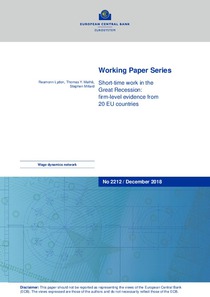Short-time work in the Great Recession: firm-level evidence from 20 EU countries
"Using firm-level data from a large-scale European survey among 20 countries, we analyse the determinants of firms using short-time work (STW). We show that firms are more likely to use STW in case of negative demand shocks. We show that STW schemes are more likely to be used by firms with high...
| Main Authors: | , , |
|---|---|
| Institution: | ETUI-European Trade Union Institute |
| Format: | TEXT |
| Language: | English |
| Published: |
Frankfurt am Main
2018
ECB |
| Subjects: | |
| Online Access: | https://www.labourline.org/KENTIKA-19306341124911245239-Short-time-work-in-the-Great-R.htm |
| Summary: | "Using firm-level data from a large-scale European survey among 20 countries, we analyse the determinants of firms using short-time work (STW). We show that firms are more likely to use STW in case of negative demand shocks. We show that STW schemes are more likely to be used by firms with high degrees of firm-specific human capital, high firing costs, and operating in countries with stringent employment protection legislation and a high degree of downward nominal wage rigidity. STW use is higher in countries with formalised schemes and in countries where these schemes were extended in response to the recent crisis. On the wider economic impact of STW, we show that firms using the schemes are significantly less likely to lay off permanent workers in response to a negative shock, with no impact for temporary workers. Relating our STW take-up measure in the micro data to aggregate data on employment and output trends, we show that sectors with a high STW take-up exhibit significantly less cyclical variation in employment." |
|---|---|
| Physical Description: | 34 p. Digital |

